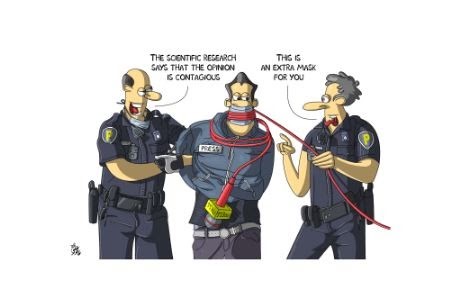109 Press Freedom Violations Linked To COVID-19 In Africa – RSF

With the effects of COVID-19 still gripping the world, over 109 press freedom violations have been linked to the pandemic in Africa, including 40 arbitrary arrests of journalists and 26 attacks on reporters, Reporters San Frontieres (RSF) has revealed.
The non-profit organisation shared these findings in a recent report, in partnership with Cartooning for Peace.
The report presents a summary of infringements of press freedom in Africa arising from the coronavirus epidemic since March 14, 2020.
Of the 109 violations recorded, 40 were arbitrary arrests of journalists and 26 were attacks, 24 of which were committed by security forces.
Fourteen sanctions or convictions of journalists or media organizations and 19 were restrictive measures while 10 were threats and intimidation.
The reports recorded violations from 29 countries. Nigeria (15 cases), Zimbabwe (14) and Uganda (12) together account for 38 per cent of the registered violations.
At the height of the crisis between 15 March and 15 May, three times as many journalists were assaulted (23) and arbitrarily arrested (31) in sub-Saharan Africa compared with the same period in 2019, according to RSF’s #Tracker_19 tool for monitoring and evaluating the impact of the coronavirus pandemic on journalism.
“This thorough report is a telling sign of the great hostility and mistrust towards African journalists and media outlets, which are too often regarded as enemies rather than allies in the fight against the coronavirus,” said Arnaud Froger, the head of RSF’s Africa desk.
“In response to uncertainty and the unknown, many governments have chosen strong-arm tactics, preferring the bludgeon to the pen, and censorship to investigating the truth of the epidemic.
“Crackdowns, the withholding of information and the criminalization of journalism are inadequate responses to the tremendous challenges facing us in this epidemic.
“We call on the countries of the continent to draw the lessons from this year’s health crisis, including the increasingly indispensable role played by journalists in providing access to reliable and high-quality news and information, by guaranteeing them greater freedom, protection, financial support and broad and transparent access to public data,” Froger added.
Press Attacks In Different Forms
The RSF report detailed several forms of attacks suffered by journalists during the pandemic.
These included censorship, media blackout, emergency and oppressive laws as well as threats made to investigative journalists.
“In some countries, the health crisis has aggravated the severe threats and pressures that already weighed on journalists before the epidemic,” RSF noted.
Since 2016 Tanzania, whose president John Magufuli has just been re-elected for a second term, has fallen 53 places in the World Press Freedom Index (to 124 of 180 countries).
In April the president decided to stop publishing details about the infection in the country while referring in his speeches to a “Western plot”.
In the worsening climate, in which self-censorship became the rule in order to avoid trouble, the news blackout made coverage of the epidemic and its effects almost impossible for Tanzanian journalists, as RSF pointed out in a report a few weeks ago.
Several news outlets, including the country’s leading Swahili-language newspaper Mwananchi, were closed down after publishing stories about Covid-19.
Others were forced to broadcast apologies after carrying reports on the subject which angered the authorities, RSF reported.
In countries where independent news and information is closely monitored or banned altogether, coronavirus has been subjected to censorship.
The government of the world’s longest-serving leader, Teodoro Obiang, president of Equatorial Guinea for the past 40 years, suspended “Buenos días Guinea” (Good morning Guinea), a popular Spanish-language programme broadcast by the country’s only commercial station Asonga TV which is owned by the president’s brother.
The programme’s seven journalists were laid off after it aired a report on violence carried out by soldiers enforcing the lockdown.
The final consequence of the public health crisis, and perhaps the most serious one for African journalism, is that the already fragile news ecosystem has never been so overwhelmed.
In Senegal, a report commissioned by the Press Publishing and Circulation Council reported a 70 per cent revenue loss for the written press during the first four months of the pandemic, 54 per cent for television networks and 40 per cent for radio stations and news sites.
“Throughout the continent, the bottom line is alarming,” RSF added.
“With this public health crisis, the sustainability of media organizations becomes not only a major factor in the future of public debate and democratic societies but an indispensable condition for guaranteeing the right to information,” said Assane Diagne, director of RSF’s West Africa office.
“The public health crisis poses an existential threat to independent information production in Africa.
This calls for re-imagining the media ecosystem on a continent where public subsidies are too rare and where the web giants scoop up a great part of the revenue generated by journalism,” Diagne noted.
Support Our Journalism
There are millions of ordinary people affected by conflict in Africa whose stories are missing in the mainstream media. HumAngle is determined to tell those challenging and under-reported stories, hoping that the people impacted by these conflicts will find the safety and security they deserve.
To ensure that we continue to provide public service coverage, we have a small favour to ask you. We want you to be part of our journalistic endeavour by contributing a token to us.
Your donation will further promote a robust, free, and independent media.
Donate HereStay Closer To The Stories That Matter




